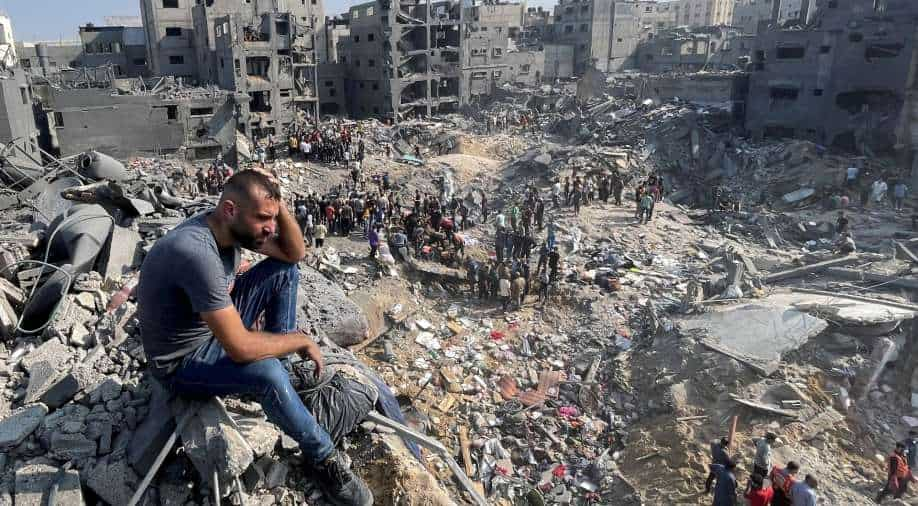Hamas-Israel war: What’s next? Sinking into a sea of hatred?
Story highlights
Israeli Prime Minister Benjamin Netanyahu’s initial response was a bombardment of Gaza so fierce that the Secretary General of the United Nations, Antonio Guterres, and human rights organizations termed the campaign “collective punishment” of a whole population for the crimes of a minority of extremists.
The enormous civilian deaths and widespread destruction of Gaza in Israel’s war to wipe out Hamas, “once and for all”, has raised a question without clear answers: Once the guns fall silent, what next?
Of a variety of attempts to peer into the future of a strip of land where entire neighbourhoods have been turned to rubble and more than a million people have been displaced, one answer stands out for me, concise and devoid of diplomatic circumlocutions.
“The whole region is sinking into a sea of hatred that will define generations to come,” said Jordanian Foreign Minister Ayman Safadi. He stood next to a tired-looking US Secretary of State, Antony Blinken, who was visiting Amman as part of a tour of Arab capitals that crisscrossed the Middle East and also took him to Turkey and India.
trending now
The tour was prompted by international outrage over Israel’s response to the October 7 murder of more than 1,200 civilians by militants from Hamas who broke through the supposedly impenetrable wall that separates Israel and Gaza for a series of massacres of savage brutality. The victims included 260 young Israelis who attended a music festival.
Hamas abducted more than 200 survivors of the slaughter and took them to Gaza as hostages.
Israeli Prime Minister Benjamin Netanyahu’s initial response was a bombardment of Gaza so fierce that the Secretary General of the United Nations, Antonio Guterres, and human rights organizations termed the campaign “collective punishment” of a whole population for the crimes of a minority of extremists.
By November 14, five weeks after the Hamas attacks, the Gaza Health Ministry reported that more than 11,000 people had been killed, including 4,630 children and 3,130 women.
Twenty-five of Gaza’s 35 hospitals were out of service, the result of a total siege of Gaza – a ban on fuel, food, electricity and water – Israel imposed at the beginning of its bombing campaign. It was followed up by a ground offensive on October 28.
Netanyahu has ruled out a ceasefire until Hamas releases all its hostages, arguing that a break in the fighting would allow Hamas to regroup and redeploy its fighters. This position has the backing of US President Joe Biden, who paid a seven-hour visit to Israel at the height of the bombing campaign and assured Israel of unconditional American backing.
He touched on the “what next?" question with an idea that has rarely looked as much as wishful thinking as it does now. “We must keep pursuing a path so that Israel and the Palestinian people can both live safely, in security, in dignity and in peace.
“For me, that means a two-state solution.”
That means an Israeli state and a Palestinian state living side by side, the Israelis within the borders that made up their land before they occupied Gaza, the West Bank, the Golan Heights and East Jerusalem in the 1967 war against Egypt, Syria and Jordan.
A United Nations Security Council resolution, 242, stipulated, “the withdrawal of Israeli armed forces occupied in the recent conflict.”
Israel withdrew from Gaza in 2005. But 56 years after resolution 242, it still occupies most of the West Bank though several enclaves are administered by the Palestinian Authority.
Israel, which has been receiving $3.8 billion in arms and aid every year for decades, has consistently ignored US policy on the matter of occupied territories – that there should be no Jewish settlements that would stand in the way of establishing a contiguous Palestinian state.
Biden witnessed Israeli disregard for US policy preferences when he visited Jerusalem in March 2010, when he was Barack Obama’s vice president.
The day after his arrival, the Israeli Interior Ministry announced 1,600 new housing units for Jews in East Jerusalem. The media called it a snub but it seemed more like a kick in the groin.
The purpose of Biden’s visit had been to restart on-and-off talks on the two-state concept.
One idea floated by experts since the war with Hamas started was to allow the Palestine Authority to run the government in Gaza. Netanyahu has dismissed that possibility and said Israel would “continue to control security there for an indefinite period” though it would not govern or administer basic services.
He did not explain how that would work. But his remarks, at a press conference, left no doubt that Israel and the United States do not have a shared strategy. Washington has said it thought an Israeli re-occupation of Gaza once the war is over would be a bad idea.
What is the difference between “control security…for an indefinite period” and re-occupation? A question yet to be answered.
So is another: Can you solve one of the world’s most difficult political problems with military means?
Here is one answer, from Seth Moulton, a Democratic lawmaker and Iraq veteran: “Israel is not going to win the war against Hamas by military means alone.” Even less by military means like bombs that kill too many innocent civilians.
(Disclaimer: The views of the writer do not represent the views of WION or ZMCL. Nor does WION or ZMCL endorse the views of the writer.)

















